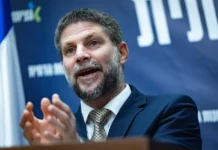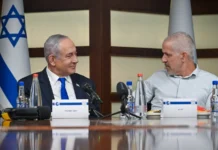Natan Sharansky, the former Soviet refusenik and Israeli statesman, spoke on Tuesday during the “March for Israel” on Nov. 14.
Sharansky spoke of his fight for Soviet Jewry to his immigration to Israel—that “they challenged the most powerful and most cruel dictatorship of those days. And that’s why many people thought that their struggle, our struggle is doomed.”
“But the fact is,” he countered, “that we never thought we were alone … when in the long years in prison, I was told again and again that I’m alone, that I’m abandoned, that we failed, it was enough for me simply to remember all those faces of Jews from America, from Britain, from Canada, who were coming to us to Moscow to support us, to understand that KGB is lying.”
Sharansky said during his imprisonment that “the picture of one Jewish fighting family was always in my head. And that is why it was so clear that … the outcome of our struggle can only be our victory.”
He described the dark shadow hanging over the Jewish state right now that “we in Israel go through difficult days, we go from one funeral of a soldier who fell fighting against Hamas yesterday, and another funeral of the family who was tortured and killed five weeks ago, but was identified only now.”
“And you go to the family whose children were kidnapped, who became hostages, and wherever you go, you hear more and more stories about torture and murder. How to keep going? You keep going by doing it together,” Sharansky said.
The Russian dissident called the Jewish people “one fighting family, a family that is so strong, which has so much love. And know that there is only one outcome in this battle: Our victory.”
Organizers told JNS that nearly 300,000 people were estimated to be at the march with another 250,000 tuned in to a livestream.
Sharansky also confronted the anti-Israel protesters in America, who are especially concentrated in academia.
“But then we find out that there is another front in this world, and it’s not in the tunnels of Gaza … but in Harvard, in Yale, in Penn, in Columbia, in all those places that are supposed to be the bastions of enlightenment and wisdom and from these places we hear today the gleeful of cheers, gleeful cheers of those who watch this most barbaric, awful pogrom in modern history and say, ‘that is liberation movement.’”


























